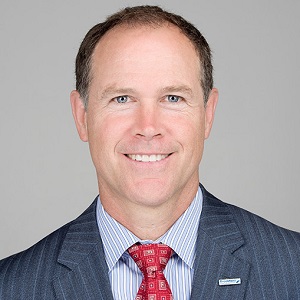Commercial real estate veteran Gordon Hicks, the chief executive of Brookfield Global Integrated Solutions in his day job, believes the industry can do a better job when it comes to reducing its environmental footprint and is doing something about it.
This month, he announced the creation of the Building Energy Innovators Council (BEIC), an industry group with up to 25 founding member companies striving to “accelerate the collaboration, innovation, and adoption of clean building technologies across Canada.”
Hicks believes energy retrofit programs, coupled with cleaner and greener technologies, will mean lower energy use and emissions. He also sees the will in industry to do better.
So what’s the holdup? “The fact the economic business cases typically, are not as attractive as they should be, or can be, or need to be,” explained the chairman of the newly formed BEIC.
“Early on, you need some incentive dollars to help make those economic business cases palatable.”
New council a bridge to somewhere
Hicks views the new council as a “bridge” between the real estate and energy utilities “that allows us to communicate effectively and provide feedback to the utilities and different levels of government as to what clients are really needing to move their economic business case forward in the form of incentives and so on.
“Equally, we need to make sure from the utilities’ perspective that we are communicating to the industry the different incentive programs that are available and opportunities that are available to the industry to help them create a better economic business case.”
The BEIC includes “recognized leaders” in commercial real estate in areas such as: general contracting, mechanical, electrical, HVAC, lighting, BAS controls, solar power, hydrogen fuel cell, electric car charging, energy storage solutions, ICT, geothermal, financial services and district heating and cooling.
A total of 18 founding members of the BEIC have been identified to date.
Taking a technological approach
The BEIC said it will support utilities and governing bodies such as the Independent Electricity System Operator (IESO), with the promotion of their renewable energy and energy-efficiency incentive programs and ensure they are effectively communicated industry-wide and adopted by owners and occupiers of real estate.
“Building technologies that improve energy efficiency and reduce carbon emissions are in high demand and we recognize the importance of creating awareness of new, clean technologies and enhancing the economic viability for their adoption within the real estate sector,” explained Hicks.
What sort of technology is BEIC high on?
“About awareness, collaboration and adoption”
“It is about awareness, collaboration and then adoption of new clean technology and energy efficiency solutions.
“On the renewable side, we are looking at solar, geothermal . . . rooftop solar, as well as parking canopy solar and potentially looking at hydrogen fuel cell technology.”
Hicks sees the BEIC as a promoter and educator of “proven” and “available” technologies now available to the real estate industry on one side, and on the other side playing a key role in “making them economical by being a voice into the different levels of government and the utilities” to ensure incentives offered make sense for the real estate industry.
Incentives coming up short
As it stands, those incentives fall sort, according to Hicks.
“The incentives are not sufficient and we need some assistance in that regard and some of those incentives need to be tailored to meet the requirement for the technology to make the economic payback requirement.”
Incentives also vary widely from province to province and utility to utility which makes implementation of green technologies more difficult for major real estate companies.
The BEIC expects to track adoption of incentive programs and provide feedback to the utilities.
“We are going to be a good partner to the utilities to make sure that their programs are getting traction and if they are not, explaining why not,” Hicks said.
The council’s current membership includes: Brookfield GIS, Brookfield Renewable, Carma Industries, Cisco, Ecobee, EnerNOC, Enwave, Forum Equity Partners, GeoSource Energy, MediaEdge, Morgan Solar, NRStor Inc., Mitsubishi Electric, Philips Lighting, Schneider Electric, Stantec, Modern Niagara and the University of Waterloo.
He sees BEIC’s role as educator and advocate but not one of industry lobbyist.
Next steps include a web presence
The council expects to have a web presence in May (BEIC.ca) that will include case studies, new technologies as well as outline the various incentive programs that currently exist in various jurisdictions across Canada.
“Depending on the province that you are in, you are getting different programs and different incentives and we are trying to make it a place where you can get information on a national basis.”
Beyond the 25 founding member companies, Hicks expects to add another 40 or 50 “members at large” who will “drive this agenda.”








